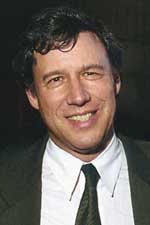Stone to leave Provost post, return to the classroom
 Geoffrey Stone, Provost, will return to teaching and research after eights years in this administrative position. |
Geoffrey Stone, the Harry Kalven Jr. Distinguished Service Professor in the Law School and Provost, has decided to step down as Provost during the 2001-02 academic year to return to full-time research and teaching in the University’s Law School and its undergraduate College.
Former President Hugo Sonnenschein in 1993 appointed Stone as Provost, the senior officer of the University under the President. He has served as Provost longer than any person since the position was created in 1962, when it was held by the late Edward Levi. Before his appointment as Provost, Stone served as Dean of the Law School from 1987 to 1993. He has been a member of the faculty since 1973.
Calling the Provost’s position “the single most demanding job in the University,” President Randel said in a statement Monday, Oct. 29, to the faculty, “It is difficult to imagine the administration of the University without him. My own gratitude to him is incalculable. I was fortunate to have him as a much-admired professional colleague before becoming a part of this community, and since that time it has been my greater good fortune to have him as a daily collaborator and as a friend. But it is as a community that we must recognize our enormous debt to himófor his keen intelligence, his endless energy and his unshakable commitment to the University. Simultaneously, one is bound to understand and respect his wish to return to the teaching and scholarship that made him an important citizen of the University in the first place.”
Randel said he will “solicit views widely on who might make a suitable successor, particularly those concerning members of our community, from which I expect the new Provost to be appointed.”
In his early years as Provost, Stone focused on restructuring the University’s budget processes in order to strengthen the University’s finances. He was instrumental in the establishment of the Biopsychological Sciences Building, which opened in 1998. He also led the University’s two-year Campus Master Planning process, which conceptualized and sited the Max Palevsky Residential Commons, the Bartlett Dining Commons and the new Press Building, which opened this year; the Ratner Athletics Center and the Interdivisional Research Building, which are under construction; the new Graduate School of Business integrated campus, which will break ground next year; and major improvements on the Midway Plaisance.
As Chair of the University’s Planning and Budget Committee, Stone made it a special priority to target University resources to strengthen faculty salaries and research; enhance academic computing and the library; increase stipends for graduate students; improve the quality of student life; support the University’s connections with the community; increase the diversity of the faculty and students; strengthen College admissions and College programs; and sustain the intellectual excellence of the University by supporting the creation of such new interdisciplinary programs as the Human Rights Program, the Institute for Biophysical Dynamics, the Institute for Mind and Biology, the Computation Institute, the Center for Teaching and Learning, the Cultural Policy Center, the Committee on Cinema & Media Studies, the Center for Gender Studies, and the Center for the Study of Race, Politics and Culture.
“No one has worked harder to make this a better place for all of us––from students to faculty––than Geof Stone,” said Michael Turner, the Bruce V. & Diana M. Rauner Distinguished Service Professor in Astronomy & Astrophysics and Physics. “While helping to get us on better financial footing, he made sure that we were still reaching for the stars.”
According to Turner, Stone worked tirelessly to keep the Sloan Digital Sky Survey on track. “Thanks in no small measure to Geof, the Sloan Digital Sky Survey is alive and producing great science––from the most comprehensive map of the large-scale structure of the universe to finding the three most distant objects in the universe.”
In the past year, Stone appointed University-wide committees to lay the groundwork for future initiatives in the arts, in international programs and in the area of computation. He already has appointed an Arts Planning Council to begin work in that direction.
As Provost, Stone worked closely with Deans and Chairs to recruit and retain the most talented and committed faculty, to foster a supportive and intellectually exciting environment for research and teaching, to pay renewed attention to teaching in appointments and promotions, and to articulate clear and rigorous standards for promotion and tenure.
During his time as Provost, he has taught eight courses in the Law School, co-edited eight volumes of The Supreme Court Review, co-authored two new editions of Constitutional Law (the nation’s leading constitutional law casebook), completed a new casebook on The First Amendment, and co-authored Eternal Vigilance: Free Speech in the Modern Era (which will be published this fall by the University Press).
Stone is a Fellow of the American Academy of Arts and Sciences, a member of the Board of Governors of Argonne National Laboratory, the Board of Directors of the National Opinion Research Center, the Board of the Chapin Hall Center for Children, the Board of the Renaissance Society and a member of the National Advisory Council of the American Civil Liberties Union.
![[Chronicle]](/images/small-header.gif)